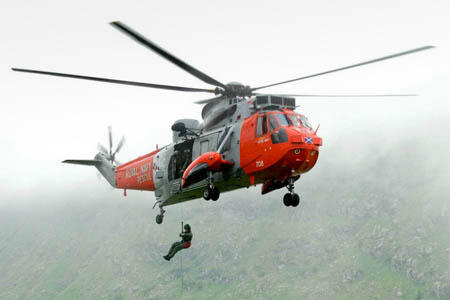
A Royal Navy crew in training in the Highlands
Britain’s emergency search and rescue helicopters will still respond to life-threatening situations during the aviation crisis sparked by the eruption of a volcano in Iceland.
The helicopters operated by the RAF and Royal Navy, along with the Maritime and Coastguard Agency aircraft, will still fly where life is at risk.
The three services support ground-based mountain rescue teams called to rescue walkers, climbers and mountaineers throughout Britain.
All normal flights were cancelled throughout Britain after the Eyjafjallajökull volcano sent a plume of acidic ash high into the atmosphere, affecting a large part of northern Europe and Scandinavia. Some restrictions on flying have been eased in parts of Scotland and Northern Ireland.
But a spokesperson for the Ministry of Defence said: “Search and Rescue will respond to life-threatening situations.”
Responses to lesser injuries will have to be dealt with by mountain rescue teams on the ground.
A statement from the National Air Traffic Service said: “The cloud of volcanic ash continues to cover much of the UK and the eruption in Iceland continues.
“Following a review of the latest Met Office information, Nats advises that restrictions preventing flights in English controlled airspace will remain in place until 1am tomorrow, Saturday 17 April, at the earliest.
“Flights in Northern Ireland and the Western Isles of Scotland to and from Glasgow and Prestwick will continue to be allowed until 7pm subject to individual co-ordination. North Atlantic traffic to and from Glasgow, Prestwick and Belfast may also be allowed in this period.
“From 7pm, forecasts indicate that Scottish airspace may be able to accept domestic flights within Scotland and Northern and southern Ireland, and north Atlantic flights to and from airports in Scotland and Northern Ireland.
“We will review further Met Office information and at 2.30pm we will advise further arrangements. In general, the situation is dynamic and subject to change.”
The Sumburgh, Shetland, Coastguard helicopter carried out an evacuation of a woman who had taken an overdose this morning. She was taken to the Gilbert Bain Hospital in Lerwick, from Out Skerries.
Martin Sykes, watch manager at Shetland Coastguard said: “After discussions with ambulance control we realised that this was a life or death situation with a casualty in a very serious condition, and that reverting to bringing the casualty to hospital via the ferry could mean that medical attention was not received in time.
“The helicopter crew made the difficult decision to fly through the clouds of ash, mist, and rain in a bid to save the woman who is now receiving treatment in hospital. After every operational trip the helicopter is given thorough clean thereby removing any debris that has built up.”
The Health Protection Agency warned that people who have pre-existing medical conditions may be affected by the volcanic plume.
However, the HPA said: “It is important to stress that the concentration of particles which may reach ground level is likely to be low and should not cause serious harm.
“If people are outside this evening and notice symptoms such as itchy or irritated eyes, runny nose, sore throat or dry cough, or if they notice a dusty haze in the air or can smell sulphur, rotten eggs, or a strong acidic smell, they may wish to limit their activities outdoors or return indoors.
“Those with existing respiratory conditions such as chronic bronchitis, emphysema and asthma may notice these effects more than others and should ensure they have any inhalers or other medications with them.”